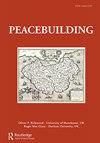Why peacebuilding is condemned to fail if it ignores ethnicization. The case of Colombia
IF 1.4
3区 社会学
Q2 INTERNATIONAL RELATIONS
引用次数: 2
Abstract
ABSTRACT Recent criticism of the liberal peace paradigm has raised awareness about racial silence and coloniality in peacebuilding and research. Drawing on ethnographic research in Colombia, this article argues that the interaction between ethnicization, armed conflict, and peacebuilding is relevant not only to so-called ethnic conflicts but to postcolonial conflict settings more generally. To demonstrate this, I first show that ethnicization is a key driver of armed conflict and its territorial expansion. I then discuss how two peacebuilding attempts, the constitution of 1991 and the peace agreement of 2016, dealt with ethnicization. Findings demonstrate that overlooking the interaction between ethnicization and conflict diminished their success. In contrast, embracing ethnic(ized) agency in peacebuilding made visible postcolonial violence, delegitimized its use, and enabled conflict transformation. The Colombian case is indicative of other contexts because it shows that peace cannot be achieved if the colonial fundaments of conflict transformation and democracy remain unaddressed.为什么如果忽视种族主义,建设和平就注定失败。哥伦比亚的案例
摘要最近对自由主义和平范式的批评提高了人们对建设和平和研究中种族沉默和殖民主义的认识。本文借鉴哥伦比亚的民族志研究,认为种族化、武装冲突和建设和平之间的互动不仅与所谓的种族冲突有关,而且与更普遍的后殖民冲突环境有关。为了证明这一点,我首先表明,种族化是武装冲突及其领土扩张的关键驱动力。然后,我讨论了1991年宪法和2016年和平协议这两项建设和平努力是如何处理种族化问题的。调查结果表明,忽视种族化和冲突之间的互动会削弱他们的成功。相比之下,在建设和平中接纳种族(化)机构使后殖民暴力变得明显,使其使用失去合法性,并促成了冲突的转变。哥伦比亚的案例表明了其他情况,因为它表明,如果冲突转变和民主的殖民基础得不到解决,就无法实现和平。
本文章由计算机程序翻译,如有差异,请以英文原文为准。
求助全文
约1分钟内获得全文
求助全文

 求助内容:
求助内容: 应助结果提醒方式:
应助结果提醒方式:


